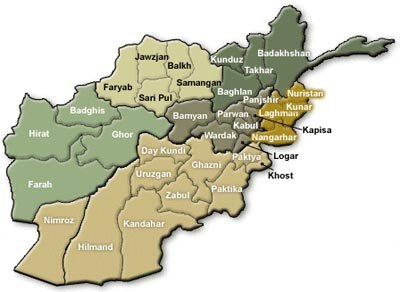US forces find footing in Afghanistan's "human terrain"
 Khost, Afghanistan - The young Texan woman talking to the Afghan tribesman wears a US military uniform and carries an assault rifle, but she's not a soldier.
Khost, Afghanistan - The young Texan woman talking to the Afghan tribesman wears a US military uniform and carries an assault rifle, but she's not a soldier.
Her training is in anthropology, which is proving an effective tool for negotiating the complexities of Afghanistan's honeycomb tribal structure and, according to a senior US commander, significantly reducing the need for "kinetic," or combat, operations.
"We describe the environment that the bad guys operate in, build a foundation for units so they can understand their area," said Audrey Roberts of the seven-member Human Terrain Team (HTT) in the eastern Khost province. "It's important so our soldiers can ask informed questions and so we don't walk round in circles."
Translated into actions, that means for example that units are able to quickly tap the real powerbrokers as they push into guarded and often fearful rural communities.
"Their expertise rapidly identified who to talk to in the village," one officer was quoted as saying during a review in the US Congress about the work of the HTTs since their inception in 2007.
"We were just ricocheting around before they got here, talking to random people. The HTT saved me an enormous amount of time - 10 to 20 hours per village - in terms of who to talk to," he said.
And beyond the initial orientation, misunderstandings and blunders that might have led to bloodshed were avoided.
"By better understanding the human terrain, we reduced the number of kinetic operations that otherwise would have occurred," concluded Colonel Martin Schweitzer, commander of the 82nd Airborne Brigade combat team that during its 15-month deployment worked in tandem with the first HTT in Khost. "We must understand the culture to win."
Since the radical Islamic Taliban militia was ousted from power in 2001, learning what makes the tribes tick has been a major challenge for the United States and other armies in the 40-country International Security Assistance Force (ISAF) in Afghanistan.
No easy task, given that there are about 60 main Pashtun tribes and 400 sub-tribes in the conflict-ridden east and south. Those can consist of a few families to hundreds of thousands of members and be entangled in ancient rivalries; they may have election processes and legal codes that vary from one village to the next.
Some tribes may support ISAF, others fight it actively with the resurgent Taliban, or simply sit on the fence.
But the Pentagon is now looking for a healthy dividend from the teams of contracted civilian anthropologists, political and social scientists, ethnic Afghan cultural advisers and army officers.
There are currently 20 HTT's operating in Iraq but only six in Afghanistan, where in some places there is no information at all about the tribes and fractures within them. The specialists are now working to redress the shortfall through close engagement.
"The only way we can do this is by going out and talking to people, asking what are their grievances and the root causes of conflicts," said the Khost team leader, Major Alex Wells.
Away from this interaction, one hurdle was overcoming reservations about the human-terrain concept among more old-school soldiers: "Even some of the hard-line infantry are now understanding that it's not just (a matter of) kill kill kill," Wells said.
But despite emphasis on achieving goals through knowledge rather than force, team members carry arms so they can defend themselves in brushes with Taliban insurgents while out in the field.
They do not take part in combat operations but can be as exposed to hazards like ambushes and roadside bombs as regular units.
Roberts, 26, wears a remembrance bracelet for her late colleague Michael Bhatia, a social scientist who died with two soldiers in a bomb blast in May. His portrait hangs over the door of their office on the main US base in Khost.
At a recent meeting with elders of the Mangal tribe, one of the largest in Khost, HTT personnel mingled and chatted to guests through Pashtun interpreters while stressing that they are not conventional military intelligence gatherers.
Whether the tribesmen really get the distinction is unclear, but partners in the local government seem receptive.
"This is the first time we had such a meeting with the coalition forces, I think it was productive," said Mirzaman Sabari, deputy head of the provincial Department of Tribal Affairs.
"If they listen to the elders and take their advice then they can properly get to know Afghan tradition and culture."